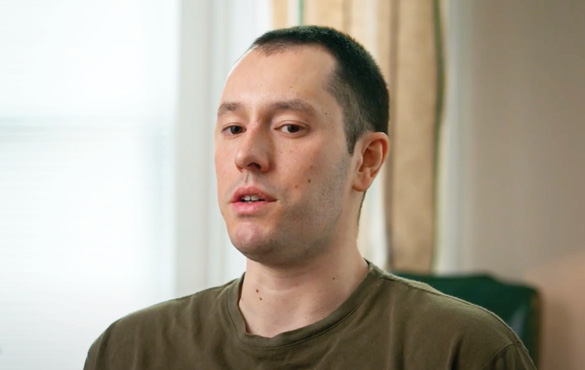Michael’s Story

Michael: Woke up, went out, and mowed the lawn. Probably high 80s, 90-degree summer day. Nice to come back in soaked. Came in, cooled down, had a shower. And then that’s really all I remember.
Joe: We were up in Maine. Michael stayed home. He was going to come up later on. The week was kind of the plan. And so we were up late that night. And about 5 o’clock in the morning, I was woken by my sister banging on the side of the camper. “Joe, Joe, get up, get up. Michael had a brain aneurysm.” And she said that they’re taking him to Mass General. On the way, We were in the car, and my wife had the phone. I said, “Google brain aneurysm. What is brain aneurysm?” And she’s Googling, and she’s reading it to me. And as she’s reading it, it’s like the more she read, the more scared I became.
Michael: My next conscious memory was probably while I was at Spaulding. A few weeks later after this, that was probably the first time I remember really opening my eyes and seeing the world again.
Tami: Joe would leave them with me at Spaulding and they did some great things as far as rehab. The rehab took a lot.
Joe: It was shocking as we went to have speech occupational and physical therapy every day. I mean, even the basic things he couldn’t do. We brought him home and as a family, we kind of learned with the girls and with Michael, you know, this is how, this is the things that we need to do as a family to help him.
Juliet: His learning how to walk again was just, it was unbelievable. But just being patient and not getting so angry about the little things. Why is the milk in the cabinet? Why is the sugar in the refrigerator?
Joe: So we became involved with the Brain Aneurysm Foundation by going to the support group meetings. So that was a big help. Going to those meetings was, it opened up us to other people who experienced this. And we stayed close to them. And then we would find different events that they were doing and go into Washington, D.C. to advocate for funding for brain aneurysm research, and it was like, wow, you know, why is it so as as you learn those things, you found out, why is it, why isn’t there any money for these kind of things?
Michael: If they detect this, you can almost leave the hospital the next day. So, a lot of the research goes into trying to detect this.
Joe: You’ve got to realize that somewhere, you know that they’re going to get to it they’re going to they’re going to find a way.
Michael: There are still so many challenges that I go through with every day, and without them, I’d be absolutely lost. It’s one of the most devastating things that one could have happen, but when it happens to the individual, it happens to the whole family as well.


 Brain Aneurysm Foundation
Brain Aneurysm Foundation